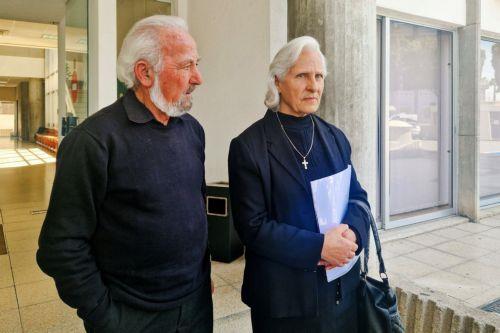The remains of conscript Thanasis Nicolaou, who was murdered in 2005, are to be returned to his family within seven days, Limassol district court decided on Wednesday.
Following an extremely tense exchange between Thanasis’ mother Andriana Nicolaou and lawyers for the former forensic pathologist Panicos Stavrianos, who had originally declared the national guardsman’s death a suicide, the judge ruled there were no pending issues and ordered the Limassol police director to hand over to Andriana her son’s bones within seven days, for reburial.
After the ruling, Stavrianos’ lawyers said they would file a request within seven days to stop the procedure and request the reopening of the death inquiry.
Initially, Stavrianos’ lawyer, Andriana Klaidi, had requested that the reading of the judge’s decision be suspended, saying that a decree cannot be issued on the basis of a simple letter from the family, that a request was pending to reopen the death investigation and reburial of the bones, which are considered vital in the event that a criminal or other case arises against her client.
Klaidi referred to evidence she said proved Thanasis had committed suicide and said “this story must finally end”, which caused a strong reaction from Thanasis’ mother.
Stavrianos’ lawyer then called for Andriana Nicolaou to be arrested and charged with voicing insults in a courtroom. The Nicolaou family lawyers objected, saying that Stavrianos’ legal advisors had made unacceptable and provocative references.
The judge said the requests did not concern the court currently and proceeded to read out her decision.
She said that the whole of Thanasis Nicolaou’s remains were to be buried within the Ayia Phyla or any other cemetery, sanctuary or monastery the family chooses, in agreement with the local and ecclesiastical authorities.
“Finally the bones of my son will come to me […] after four-and-a-half years that they have been kept at the police until these proceedings were concluded,” Andriana Nicolaou said after the ruling.
“We exhumed our child and he spoke alone from the grave. He told the truth. His bones spoke, the scientists spoke,” she said and wondered why the family was still being distressed.
She added that what happened in the courtroom was unacceptable and that Stavrianos was “still trying to buy time”.
“It has been 20 years that we are tormented because of him and I want to ask who will pay all these expenses, the toil, the torment, the hell we have been living for 20 years,” Andriana Nicolaou said.
Speaking after the ruling, Klaidi said “we have been instructed by our client to file, within the next few days, a request to reopen the death inquiry, in order for the true cause of death to be made apparent, which is a fall from a height with no criminal action.”
“There is a testimony from Scotland Yard, by a senior forensic pathologist, an anthropologist, verifying Dr Stavrianos’ findings and those of the other specialists, that it is a fall from a height and there is no criminal action. There had never been strangulation and there had never been a murder,” she added.
Thanasis Nicolaou’s family had requested that the remains be handed over following the conclusion of an investigation into his death carried out by lawyer Thanasis Athanasiou and retired Greek police lieutenant Lambros Pappas.
Nicolaou had been buried in the cemetery in the Limassol suburb of Ayia Phyla, and his remains were exhumed in 2020. Since then, they have been kept in an ossuary belonging to the Greek orthodox diocese of Limassol.
The legal service had responded positively to the idea of Nicolaou’s bones being returned to his family but had suggested that tissue samples should not be returned as they may later be needed during criminal proceedings relating to his death.
The Athanasiou-Pappas report had concluded both that Nicolaou died due to a criminal act, and that seven people, including Stavrianos, bear responsibility.
Alongside Stavrianos, two military officials and four members of the police force have been held responsible.
Stavrianos had ruled in 2005 that Nicolaou, who was found dead under a bridge near the Limassol district village of Alassa, had committed suicide, while his mother had for nearly two decades campaigned to have Stavrianos’ ruling overturned.







Click here to change your cookie preferences